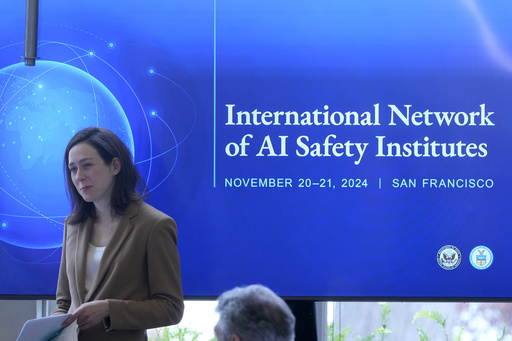WASHINGTON — As artificial intelligence (AI) continues to develop rapidly, the federal government is shifting its focus from prioritizing protective measures to streamlining processes. This shift may excite some investors but raises questions regarding the future oversight of technology, particularly concerning the use of AI-generated deepfakes in political contexts.
President-elect Donald Trump has indicated intentions to overturn President Joe Biden’s extensive executive order on AI, which aimed to safeguard individual rights and safety while fostering innovation. Although Trump has not detailed a replacement plan, the agenda of the restructured Republican National Committee emphasizes that AI development should be fundamentally linked to free speech and the betterment of humanity.
Whether Congress, which will soon be under complete Republican control, will prioritize AI legislation remains uncertain. Conversations with various lawmakers and industry professionals indicate a continued interest in enhancing the technology’s application in national security and regulating explicit non-consensual content. However, as Republican leaders are wary of any proceedings perceived as limiting innovation or free speech, issues surrounding AI’s role in elections and misinformation may be deprioritized.
“AI presents remarkable opportunities to boost productivity and positively impact the economy,” stated Rep. Jay Obernolte, a California Republican noted for his involvement in technological advancement. He underscored the need for a balanced approach, establishing frameworks to mitigate harm while allowing innovation to thrive.
For years, advocates in the AI sector have anticipated comprehensive federal regulations. However, due to Congress’s ongoing difficulties with bipartisan cooperation, no significant AI legislation has materialized, only a myriad of proposals and reports. Some legislators believe there is enough shared interest to potentially advance a bill regarding certain AI matters.
Democratic Sen. Gary Peters remarked that there are Republicans who are genuinely engaged with this issue, particularly concerning national security. He expressed optimism about working collaboratively, reflecting his experience with cross-party efforts in the past.
The extent of Republicans’ willingness to endorse federal involvement in AI remains ambiguous. Prior to the election, few lawmakers showed enthusiasm for regulating how federal bodies like the Federal Election Commission managed AI-produced content, fearing that it could violate First Amendment rights. This stance coincided with the fact that Trump’s campaign and other Republicans successfully employed the technology to create memes without a primary intent to mislead voters.
During Trump’s presidency, the FCC was engaged in an extended process to develop relevant regulations, but this effort was stalled following the change in administration. Trump himself has exhibited both enthusiasm and hesitation toward AI. In a Fox Business interview earlier this year, he voiced concerns that AI is “very dangerous” and “so scary” due to a lack of clear solutions, yet he and his supporters have actively used AI images as part of their political messaging.
Elon Musk, a close advisor to Trump and a founder of several AI-driven enterprises, shares this dual sentiment regarding AI’s promise and dangers, often promoting AI-generated content across his social media platform, X. Advocates from Americans for Responsible Innovation are encouraging Trump to consider Musk as a prime advisor on AI technology, arguing that he possesses nuanced understanding about both benefits and pitfalls of advanced AI systems.
However, some, such as Sen. Peters, believe Musk’s close association with Trump may pose conflicts of interest. “It raises concerns,” noted Peters, suggesting that financial motives should lead to cautious evaluation of advice concerning technology.
As the election approached, AI specialists voiced worries about the potential emergence of a last-minute deepfake capable of misleading voters. Though these fears did not manifest, AI undeniably impacted the electoral landscape. Vivian Schiller, from Aspen Digital, characterized AI’s role in the 2024 election as significant yet not in anticipated ways.
Campaigns leveraged AI to refine voter messaging through targeted algorithms. Although AI-generated memes lacked the realism to be misinterpreted as authentic, they nonetheless contributed to deepening partisan rifts. For instance, political consultants created robocalls mimicking Biden’s voice that could have misled primaries voters in New Hampshire if swiftly corrected. Additionally, foreign entities deployed AI technologies to create fake profiles and websites for disseminating misinformation to American audiences.
Even if AI did not decisively affect the election outcomes, its usage raised concerns about public trust in media authenticity, which some AI industry stakeholders believe necessitates regulatory frameworks. “President Trump’s team has expressed interest in supporting technology development, which is promising news,” stated Craig Albright from The Software Alliance, an industry coalition including OpenAI and IBM. “Establishing national rules will foster market growth for the technology.”
During a recent assembly of AI safety advocates in San Francisco, similar sentiments were echoed by Suresh Venkatasubramanian, Director of the Center for Tech Responsibility at Brown University. He compared the need for AI regulations to road rules that enable vehicle innovation while ensuring safety.
Despite this, Rob Weissman from Public Citizen remains skeptical about the likelihood of effective federal legislation coming to fruition, particularly in light of Trump’s announcement regarding Biden’s AI executive order, which had set foundational standards. His organization has argued for regulatory measures to ensure that generative AI is ethically deployed in elections. “Safeguards also promote innovation, enabling AI that benefits society while ensuring public interest is prioritized,” he emphasized.


